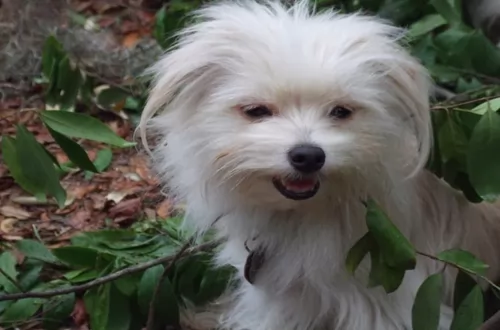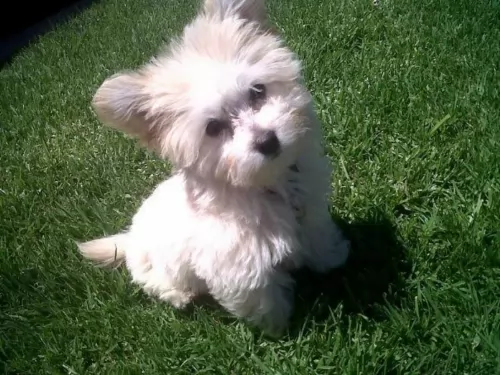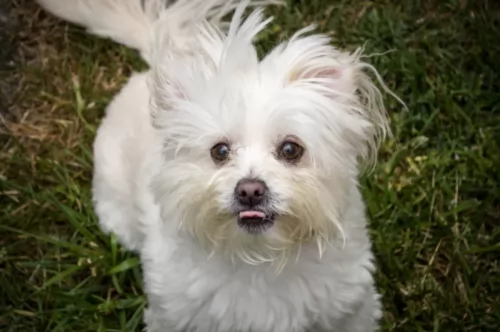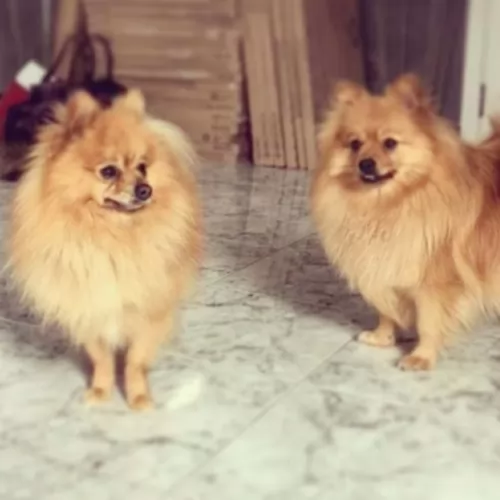 Petzlover
PetzloverDamchi is originated from Bhutan but Malti-Pom is originated from United States. Damchi may grow 15 cm / 6 inches higher than Malti-Pom. Damchi may weigh 8 kg / 18 pounds more than Malti-Pom. Both Damchi and Malti-Pom has almost same life span. Damchi may have more litter size than Malti-Pom. Both Damchi and Malti-Pom requires Moderate Maintenance.
The exact origin of the Damchi isn’t particularly well documented but those who are interested say that the Damchi actually dates back as far as the 17th century, descending from different ancient Terrier- and Spaniel breeds.
It appears the dog comes from the Himalayan village of Damchi. The former King of Bhutan owned a Damchi and this dog has been featured on one of the country’s postage stamps. Today it is a loved dog in Bhutan, Asia while a few are found in Germany.
 The sweet little Malti Pom is a dog which comes from crossing two purebreds – the Maltese Poodle and the Pomeranian.
The sweet little Malti Pom is a dog which comes from crossing two purebreds – the Maltese Poodle and the Pomeranian.
The appearance of this dog will vary according to how much of each breed is in the dog. The exact origins of the Maltipom breed are unknown but many new dog breeds have originated in the United States.
The Maltipom is also not recognized by the AKC because it’s a hybrid of two pure breeds and not looked upon as a new breed. It is however recognized by the American Canine Hybrid Club.
The Damchi is a small to medium breed dog and is part of the toy group. The dog stands up to 43cm tall and can weight 13kg.
His silky coat comes in different colors such as black and white or tan, brown and fawn. He has a lot of long soft fur but its a dog that doesn’t shed much. He has ears which are high set and which flop down and the tail is long and feathery, curling over the back of the dog.
People who know the dog say that they are similar looking to the Tibetan Spaniel, although the Damchi is a bit longer and more sturdy.
Known also as the Bhutan Damchi or Bhutanese Damchi, the Damchi is an active dog that is intelligent and devoted to its human family, although he is known to be aloof with strangers.
Known for his playful, jaunty nature, he is a small dog that is full of character, wanting to be with- and to please his human family. Sweet and gentle, he gets on well with children and pets in the home and will turn out to be a good watchdog too.
They are intelligent dogs and easy to train and will easily respond to tasks given to him. He will benefit from being trained and socialized. He becomes obedient and will easily adapt to life in the city or the country, so long as he is close to his human family, providing them with ongoing entertainment.
He is a social, friendly breed that can suffer with separation anxiety and he will simply pine away if he is left in the backyard and ignored.
 The Malti-Pom is a crossbreed, so pinpointing his exact size can be somewhat difficult, but you can expect him to be in the region of 20 to 28cm and weigh in at about 2 to 5kg.
The Malti-Pom is a crossbreed, so pinpointing his exact size can be somewhat difficult, but you can expect him to be in the region of 20 to 28cm and weigh in at about 2 to 5kg.
Both the Maltese and the Pomeranian are both toy dogs, so the Malti-Pom is almost sure to be a small dog. His appearance will also vary depending on which side he inherits most of his looks from. Generally though, he has a long coat of straight, soft hair.
He is a low shedder and with the poodle side of him he is looked upon as being hypoallergenic. The coat can be cream, apricot, white or black as well as a combination of these colors.
This is such a friendly, amicable little dog. He is good with children and can get on well with other pets in the home.Children should be taught to be gentle with any dog, but particularly a small one like this.
The Malti-pom is extremely loyal and affectionate with its family members, but ends to form a special bond with one member of its family.
These little dogs are generally reserved with strangers. They are well-behaved, sociable and can mix well with children and pets in the home. These toy dogs are clever so you won't battle with him with training and socialization.
Although the Maltipom looks cute and is an amicable dog, he can bark quite aggressively when he encounters strangers who he believes might harm his family. He makes a good watchdog.
The Damchi dog is such a robust, amicable little canine friend for anyone who appreciates his characteristics. Loving, loyal, social and friendly, the Damchi is one hang of a little dog.
He is fairly low maintenance, he won’t eat you out of the house and he isn’t a sickly dog. When you think of all the wonderful years of friendship he offers, anyone who chooses him won’t have one single regret.
 Because your Malti-Pom comes from two different dog breeds, you can’t really say what kind of personality traits he will inherit.
Because your Malti-Pom comes from two different dog breeds, you can’t really say what kind of personality traits he will inherit.
Both the Maltese and the Pom are small lap-type dogs who are essentially companion dogs. You can be sure your Malti-pom is going to be cute, social, energetic, vibrant and loving. They are able to adapt well to life in the city or the countryside and a nice walk every day will go down well in terms of exercise. It give your pet a chance to get outdoors and to sniff new scents.
With the Maltese and the Pom being the two parents of this dog breed, you can be sure that you’re going to have a splendid little pet who is guaranteed to bring lots of smiles into your home from his jovial, entertaining ways
The Damchi is known to be a robust dog who doesn’t suffer from many health problems, but there are some common health issues that are good to know about so that you can get your pet some help.
Some of the common health problems are hip dysplasia, hypoglycemia, brachycephalic airway syndrome, epilepsy and dental disease.
A drop in blood sugar can be brought on by stress and this condition is more prevalent in toy breeds. If you find your Damchi lethargic, battling to walk properly or shivering, be aware of this drop in blood sugar as it can send your little dog into a fatal coma.Get him to the vet immediately.
 Fortunately, the Maltipom is considered to be a healthy dog, and he can live with you for a good number of years with good care. The Maltipom could develop heart issues.
Fortunately, the Maltipom is considered to be a healthy dog, and he can live with you for a good number of years with good care. The Maltipom could develop heart issues.
Heart disease is fairly common in dogs and some symptoms will include a cough, loss of appetite and he might tire easily. One of the common types of heart disease is degenerative valvular disease, where the heart valves fail.
It is believed that degenerative valve disease is a heart disease which accounts for about 75% of all heart disease in dogs. Diagnosing heart disease requires a number of different testing methods.
The Damchi is an active breed, who loves to be involved with everything his family is involved in. He will need to be provided with games and exercise as he is full of beans and will just love to go with you on your walks. Indoors or outdoors, he is always looking out for a game.
The Damchi has a long coat and to keep it silky and shiny it will require brushing twice a week to ensure no tangles and matting.
Dental disease is more prevalent in small dogs so prevent plaque build-up by ensuring you brush your pets teeth 2 or 3x a week.
Your Damchi might have entertained you so much you may want to just give him one treat after the next. Be careful of feeding a small dog too much as a leaner dog lives a healthier, longer life free of many diseases.
Make sure you have your pet with you for 12, 13 or 14 years by ensuring he gets a bowl of nutritious food according to his size and age. With a well planned diet which consists of kibble, some home-made food such as brown rice, vegetables and chicken you’ll be doing your pet a tremendous favor by promoting good health. Never leave your pet without a bowl of fresh, cool water.
 The Maltipom is a tiny dog, and that’s an advantage actually as he isn’t going to cost you too much to feed. Half a cup of food in he morning and another in the evening will keep him satisfied.
The Maltipom is a tiny dog, and that’s an advantage actually as he isn’t going to cost you too much to feed. Half a cup of food in he morning and another in the evening will keep him satisfied.
If you give him commercially manufactured food, choose a high quality one specially made for small dogs. You can chop up cooked chicken, brown rice or pasta and some cooked vegetables finely and add this to his dry kibble from time to time as a tasty treat.
A tiny little bit of raw meat once in a while will also keep him healthy. Keep things simple – don’t try all sorts of weird foods with him as he can battle with digestive problems.
Groom your pet. Brush him at least twice a week. Check his eyes and ears for infection and remember to brush his teeth at least 2 or 3 times a week with special canine toothbrush and toothpaste.
Make sure he is exercised. He'll love a walk each day.